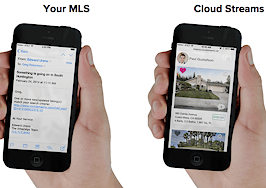- W&R Studios conducted a study finding that its Cloud Streams listing alerts were faster and more reliable than those of Zillow, Trulia, realtor.com, and other portals.
- Inman sent the tested portals a copy of the study data. Most said little or nothing to refute the findings.
- How fast homebuyers learn about a property may mean the difference between whether they get it or not, especially in a fast-moving seller's market.
When a home search becomes serious, one of the first things a buyer does is sign up for saved search alerts on the most popular listing sites. Then she watches her inbox like a hawk.
The speed at which she learns about a particular home can mean the difference between buying it or not — especially in a fast-moving seller’s market.
But when it comes to listing alerts, not all sources are created equal. W&R Studios, maker of MLS listing alert tool Cloud Streams, has conducted an internal study finding that Cloud Streams’ alerts are faster and more reliable than those of Zillow, Trulia, realtor.com, Homes.com, Redfin, Estately and a regional brokerage site, johnlscott.com.
Cloud Streams is a tool that allows agents to sign their clients up for “real-time” listing alerts via email or text message for new listings matching their search criteria or listing status or price changes.
Cloud Streams’ product is available to 362,000 agents in 40 MLSs. Eight of those MLSs have site-licensed the product, meaning they have purchased subscriptions for all of their members — more than 200,000 agents combined.
It may appear self-serving or all too convenient that an internal study’s findings turn out to favor the company doing the study. But W&R Studios says it merely did what consumers do every day: it saved specific searches on these major sites and watched alerts come in.
How listing alerts work
Cloud Streams listing alerts link directly to a client’s personalized property “stream” — kind of like a Facebook news feed, but featuring properties instead of baby pictures.
The company took note of when each alert arrived from each site — if it arrived at all — and compared that to when Cloud Streams sent out its own alert.

Greg Robertson
“The results were pretty shocking,” said Greg Robertson, co-founder of W&R Studios, in a statement.
“In total, we tested five major metropolitan markets and are now releasing the data for two of them, Southern California and the Seattle area. In every case, Cloud Streams beat them all.
“In the Seattle area, buyers using Cloud Streams would get listing alerts up to 23 hours faster than Zillow’s ‘Instant’ alerts on average, and up to 45 hours faster than listing alerts on realtor.com,” Robertson added.
“The other side of the coin is reliability. Of 56 qualifying properties, Zillow only sent out 25 alerts (45 percent), realtor.com only sent out 29 (52 percent).”
For websites that tout how great they are for consumers — and spend hundreds of millions of dollars on tech — the results are pretty awful, Robertson told Inman.
“It’s like the emperor has no clothes, a little bit,” he said.
What the study looked for
The study was narrow in the sense that every consumer search is narrow: only alerts matching the saved searches were tracked during the study period (Sept. 17, 2015 to Dec. 21, 2015).
In the Seattle area, the saved search was for a 1,000-square-foot single-family residential home in Auburn, Washington, listed for between $200,000 and $350,000, with two or more bedrooms and two or more bathrooms. A total of 56 properties matched this criteria during the study period.
In Southern California, the saved search was for a 2,500-square-foot single-family residential home in the 92646 ZIP code (Huntington Beach), listed for between $800,000 and $1.25 million, with four or more bedrooms and three or more bathrooms. A total of 13 properties matched.
Cloud Streams itself delivered all but three of the 69 total properties.
Inman sent every site tested a copy of Cloud Streams’ study data and asked each to compare the data to their own.
Most said little or nothing to refute Cloud Streams’ findings, though one — Redfin — did offer some nuance on the results.
Zillow Group
First things first. What did the parent company of Zillow and Trulia have to say?
In an emailed statement, Zillow Group spokeswoman Amanda Woolley said: “The listing speed and accuracy on Zillow has never been better now that we get listings directly from the source. We work with more than 400 MLSs and more than 13,000 broker partners, and we put a lot of time, money and effort into ensuring home shoppers are having the best experience possible, including timely and accurate home notifications.”
Robertson told Inman he chose to highlight these two markets specifically because Zillow Group has a direct feed with California Regional MLS (serving Southern California) and does not have one with Northwest MLS (serving the Seattle area).
Having a direct feed did appear to help the speed at which alerts from Zillow were delivered. Zillow alerts for the saved search in Southern California were delivered an average of about five hours after Cloud Stream’s alerts, compared to 23 hours in the Seattle-area search.
The alerts were also more comprehensive in the sense that Zillow sent out alerts for 77 percent of the matching properties in Huntington Beach, compared to 45 percent of those in the Seattle area.
Despite the direct feed, though, Trulia fared the worst among the sites tested in terms of reliability. The site only served up 23 percent of matching properties in Huntington Beach, and an average of 16 hours later than Cloud Streams’ alerts.
Realtor.com
What of the site that has direct feeds from nearly every multiple listing service across the country?
Realtor.com’s listing alerts went out about 22 hours on average after Cloud Streams’ alerts in Huntington Beach, though they were the most reliable among the sites tested: they included 85 percent of matching properties.
In the Seattle area, realtor.com’s alerts went out about 46 hours on average and only included 52 percent of matching properties.
In an emailed statement, Christie Farrell, spokeswoman for realtor.com operator Move Inc., said: “Greg’s information could be out of date, and may not represent a true comparison among the services. We recently updated our Listing Alerts feature in addition to several other performance enhancements on realtor.com.
“Registered users now have the option to receive Listing Alerts from the industry’s most accurate and up-to-date listings inventory four times per day, and work continues toward even more frequent notification. It’s possible our recent work impacted his analysis.”
She declined to say whether or not realtor.com had direct feeds from CRMLS or NWMLS.
Homes.com and John L.Scott
Homes.com declined to comment. In the Seattle-area test, the site had the worst speed rate of any of the portals (a 48 hour-delay on average) and the worst reliability (only 18 percent of matching properties delivered).
John L. Scott Real Estate, which delivered just 52 percent of the matching properties on an average 19-hour delay, did not respond to a request for comment.
Estately
Listing alerts from Seattle-based Estately came in three hours later, on average, than Cloud Streams alerts in its own backyard. The site delivered about 61 percent of the matching properties. Testing in Huntington Beach yielded similar results.

Galen Ward
In an email, Galen Ward, co-founder and CEO of Estately, said, “It is possible that in Western Washington they beat us by 1-2 hours at some times” because of NWMLS’s custom technology, but that outside of Washington State, nearly all listing updates are sent in under 15 minutes.
“I’ll have to ask Greg to set me up with search alerts in NWMLS to see what they’re seeing. Look forward to the competition!” Ward said.
When asked about the hours-long delays in Southern California, Ward said, “That doesn’t match up with what we’ve seen when we’ve run tests in the past. We’d have to run some tests here — or better yet, get a CloudStreams alert setup so we can actually compare.
“Unfortunately, I can’t tell you definitively what’s going on here without seeing the exact homes that took a long time to update or comparing services head-to-head.”
Redfin
Redfin, a national brokerage website that receives its listing data directly from MLSs, fared best among the portals in terms of speed — and in the Seattle test, in terms of reliability, as well.
In Southern California, Redfin alerts were delivered an average of one hour after Cloud Streams alerts. In the Seattle area, it was two hours. Reliability in the Seattle test was 80 percent. It was 62 percent in the SoCal test.
But unlike the other portals, Redfin did find a discrepancy between its own data and Cloud Streams’ data.
It turns out that Cloud Streams and the other portals appear to count bathrooms differently than Redfin does. Cloud Streams and the portals count toilets; Redfin takes the bathroom count from the listing agent.
“On the CRMLS list, Cloud Streams indicated their search was for 3+ bathroom homes, but four out of the five properties where they did not receive a Redfin alert were 2.5 or 2.75 bath homes. Redfin would not have alerted on those homes because they did not meet the search criteria,” Redfin spokeswoman Jessica Bryant said in an email.
“Redfin takes the data from the MLS and normalizes it to the exact bathroom count specified by the listing agent. So 1/4, 1/2 and 3/4 are not counted as full bathrooms, per industry standard.
“The quality of Redfin’s results is better matched.”
If the properties Redfin matches differently from the other portals are removed, the site’s reliability percentage in SoCal rises to 89 percent, according to W&R Studios.
As far as the speed test results, Bryant later told Inman that Redfin pulls data from MLSs every 15 minutes and that data immediately goes up on redfin.com — but if a listing has no photos Redfin’s system will wait up to one hour before sending out an alert.
“That’s really a choice that we made mainly from a user experience point of view. Searching for real estate can be a very visual process,” Bryant said.
“If you see a grainy photo … you might not be tempted to click through,” she added.
Moreover, she said, “You need an agent to get you the Cloud Streams alerts or any MLS alerts” — so for consumers who do not yet have an agent or haven’t picked a neighborhood, “Redfin is definitely the most self-service of all of them and the most consumer facing.”
Cloud Streams waits just a “few minutes” before sending an alert with no photos, according to W&R Studios.
Why Cloud Streams is faster
The problem with portals — and MLS systems for that matter — is the more saved searches they have, the slower their listing alerts are, according to Robertson.
W&R Studios, which has 30 employees, built Cloud Streams so that number of saved searches has no effect on how it scales, he said.

Dan Woolley
W&R Studios co-founder Dan Woolley (no relation to the Zillow spokeswoman) described the process this way: “Instead of going through every saved search and seeing what listings match, you instead go backwards. Drop a listing on top and let it percolate down through the saved searches.
“For every listing as it comes through the queue, you can percolate every single listing down kind of in parallel. These listings can just drop in all day long from the top and come out the bottom and light up whatever matches it has.”
This “percolation” process is a new way of doing things that scales well — crucial to a small company that doesn’t have a lot of resources, Woolley said.
“We’re charging money for this service when everyone else is doing it for free, so we have no choice but to do it faster, better and more beautiful,” he said.
Next steps
Robertson knows that his company’s study may not be taken seriously by some. Therefore, he’s looking for an independent firm outside of the real estate industry to conduct a more comprehensive study.
“We’re researching firms that would be able to do that for us, so if we find the right firm, we’re definitely going to do it,” he said.
The independent study will encompass not just portals, but MLS systems as well, Robertson said.
Agents can already sign up their clients for alerts from the MLS for free. But most MLS systems only have the option to send alerts out once a day, not in real time, according to Robertson.
And unlike Cloud Streams, MLS systems don’t generally send text alerts, which are much more likely to be read immediately than emails, he said.
The MLS is the best source of listing data there is — but the appearance and user interface of MLS alerts detracts from that, according to Robertson.
“The problem is that they just look so awful. They look almost spammy with this long URL,” he said.
Cloud Streams has a “unique value proposition” in that it combines the best data with a consumer-quality tool, Roberston said.
“It gets the agent back to their most valuable asset, which is access to MLS data, and we’re giving them a tool that highlights that and shines on that,” he said.
Consumers should know that the best way to get the fastest, most reliable data is to go to an agent, he said.
“It’s really important, especially now when inventory is low … being the first to know is a big deal.”









